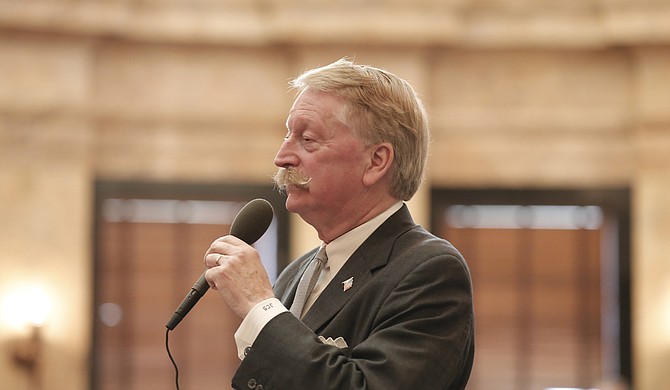Rep. Jeff Smith, R-Columbus, the chairman of the House Ways and Means Committee, significantly reduced the potential impact of the Senate’s Taxpayer Pay Raise Act, before sending it back to the Senate last week; the Senate voted Friday to invite conference and not concur with the House’s changes. Photo by Imani Khayyam.
Despite Republican supermajorities in both the House and the Senate, there seems to be little agreement across the chambers on tax legislation and budget proposals this year. This session's hotly debated and contested tax break and tax-increase bills have either died or gone through reconstructive surgery in the opposite chamber.
The Senate's Taxpayer Pay Raise Act, which Lt. Gov. Tate Reeves supported and Sen. Joey Fillingane, R-Sumrall, authored, would phase in tax cuts for 3 and 4 percent income-tax brackets, the corporate franchise tax, and small business and self-employment taxes. When the House Ways and Means Committee was finished with it, the bill looked completely different.
Committee chairman Rep. Jeff Smith, R-Columbus, told his committee that the amended version of the Taxpayer Pay Raise Act would only cost the state $134 million instead of the projected $575 million that the Senate's version would have diverted from the state's general fund over a period of 15 years. Smith's amendments only left the lowest income-tax bracket cut—a drastic revision to Fillingane's original bill.
Even with the changes, Senate Bill 2858 caused an uproar on the House Floor last week—particularly because the Senate bond bill called the "last chance" for the state's crumbling infrastructure to receive funding this year died in committee. Without a bill to specifically increase funding for infrastructure, Democrats tried amending the Taxpayer Pay Raise Act on the floor.
By the time the Taxpayer Pay Raise Act left the House, Smith added a reverse-repealer to the bill, which will force the bill to go to conference, and Rep. Thomas Reynolds', D-Charleston, amendment to establish a lottery in the state was added to the bill.
Fillingane asked the Senate to not concur on the House's changes on Friday, and invited conference instead.
Lt. Gov. Reeves did not express support for Smith's changes.
"I appreciate Chairman Smith and the House Ways and Means Committee for keeping alive the hopes of meaningful long-term tax relief this session," Reeves said in a statement. "The simple question that must be answered in the coming days: How many representatives share my core philosophical belief that lower taxes and less government will lead to a stronger economy and more jobs?"
Transportation "Dummy" Bill Dead
House Transportation Committee Chairman Charles Busby, R-Pascagoula, told the Associated Press April 2 that the push to increase money for the state's roads and bridges is dead for this year.
An amorphous bond bill, Senate Bill 2921, which contained multiple tax-code sections in state law—including the state's gas tax—and bonds died in Busby's committee. That meant that increased funding for the state's roads and bridges may have to wait another year.
Busby told the Associated Press that many representatives instead demanded money-saving efforts at the Mississippi Department of Transportation, which says it needs another $526 million a year to prevent deterioration of state highways and bridges. The Mississippi Economic Council has called on the Legislature to invest at least $375 million annual increase in funding and supported the now-dead Senate Bill 2921.
In a hearing with House Democrats, Melinda McGrath, the executive director of the Mississippi Department of Transportation, said that roads in this state that get the least amount of attention are two-lane highways. All of the state's interstates, four-lane and two-lane highways are all below the average pavement conditions and have been for at least two years. House Democrats later asked a representative from the state Department of Revenue about the impact of increasing gas or sales taxes to leverage funding for the state's infrastructure needs.
When the Taxpayer Pay Raise Act came to the floor, Rep. Robert Johnson, D-Natchez, introduced three amendments to address infrastructure needs including eliminating infrastructure exemptions and raising the gas tax. All his amendments failed.
The state's interstate system has been below the average condition rating for pavement since 2010. MDOT is responsible for 908 posted and deficient bridges that would cost $2.5 billion to repair. The state's infrastructure system supports 90 percent of all commerce traffic and 60 percent of statewide traffic, MDOT data show.
Busby told the Associated Press last week that House Speaker Philip Gunn, R-Clinton, is likely to appoint a committee to study the issue before the 2017 legislative session, and that such a process might help persuade people who are currently opposed to any tax increase. Busby said some money can be saved but not enough to cover all the agency's needs.
"I don't think we're going to drag $400 million in efficiencies out of MDOT," Busby told the Associated Press.
House leaders had faced reluctance to raise taxes among many Republican members, when members of the anti-tax Americans for Prosperity, who have been meeting with legislative opponents of the plan, raised questions about operational efficiency the Associated Press reported.
Read more legislative coverage at jfp.ms/state. Email reporter Arielle Dreher at [email protected] and follow her on Twitter @arielle_amara.



Comments
Use the comment form below to begin a discussion about this content.
comments powered by Disqus